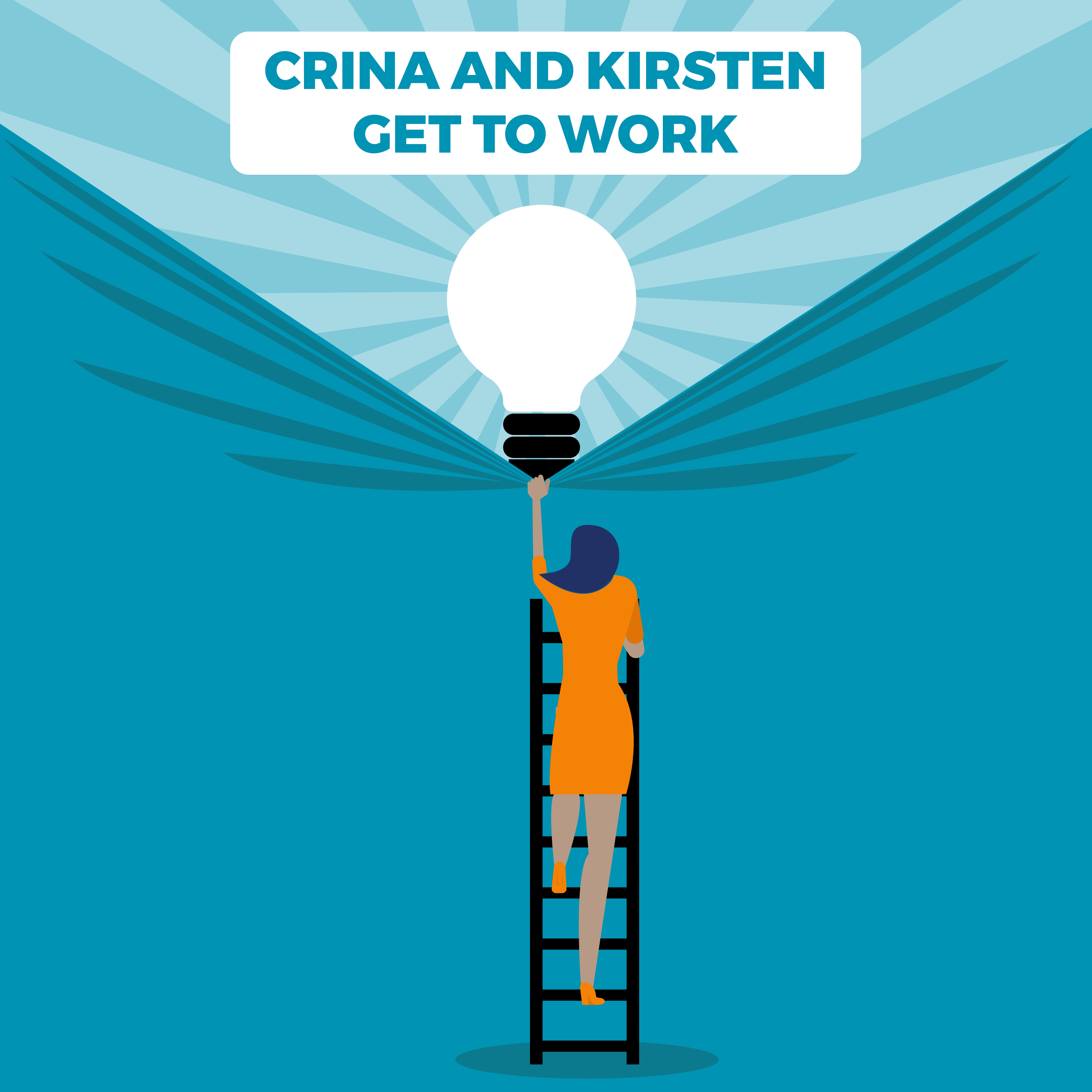Crina and Kirsten Get to Work

We have one single mission: Help women find ease, meaning and joy at work and in life. We use our experiences as business owners, entrepreneurs, mentors and inspirational leaders to explore topics that all working women care about: shitty bosses; smashing the patriarchy; balancing work and life; navigating change and getting what you want! We guarantee that you will be entertained and inspired... promise!
Episodes
Episodes



Friday Jan 01, 2021
What are your intentions?
Friday Jan 01, 2021
Friday Jan 01, 2021
Each one of us will be someone different at the end of this year and we can influence what we become - healthier, more peaceful, kinder, richer or whatever - or not. As Abraham Lincoln said, “the best way to predict the future is to create it.”
SHOW NOTES
On this 50th episode of Crina and Kirsten Get to Work, our hosts talk about intention in the workplace. And if you can wait for Kirsten to tell her story about floating in a sensory deprivation tank, you can hear all about intention and how it helps us in accomplishing goals, actualizing resolutions and just getting done what we want to get done in the way we want to get it done and how we want to feel while we are doing it.
As we start the New Year, many of us set goals, make resolutions, create vision boards, choose words to define our year and engage in all kinds of other actions and activities to help us create the year we want.
What is intention? It’s worth consideration. Intention is something we want and plan to do - the process we go through until we accomplish what we want to accomplish. And of course our hosts like to get all intellectual every once in a while (to offset the smack talk), intent originates from the Latin word “intentus” which means an extending, attentive to, and strained.
Now that we know what intention is - why do we care so much? Each of us will be someone else at the end of 2021 - and who we end up being depends largely on our intentions. With intention, we are more likely to achieve our goals, create more of what we want, be more present and mindful and have more fun.
How do we bring intention to our lives? Mindfulness and awareness are good starts, but it is something more than this and requires the energy of effort, extending, moving in the direction of the end result. Here are some suggestions - and intentions should be positive, otherwise we risk sabotaging ourselves:
take intention breaks - stop and set your intention
just any moment of the day
when you want through a door, what is your intention in the room
in the shower as you start your day
ritualize your intention setting, i.e. every Sunday, on your walk etc.
planning is a form of intention
journaling
list making
mediation
And two fun reads:
Why setting intentions is the way to achieve your goals | by Coralie SAWRUK | Medium
3 Tips to Create an Intentional Workplace - Fierce (fierceinc.com)



Friday Dec 18, 2020
Holidazed and Confused
Friday Dec 18, 2020
Friday Dec 18, 2020
December is either a magical, mystical month or humans are so tired of the cold and dark that we have evented no less than 40 sacred or secular celebrations – all packed into the month of December – at least according to Wikipedia!
SHOW NOTES
Happy Holidays – well, at least Holidays with more ease, meaning and joy. On this episode of Crina and Kirsten Get to Work, our hosts tackle the holidays at work.
How do you feel about the holidays – are you a scrooge and don’t enjoy the holidays or just do not want to participate? Are you a Tiny Tim and do it out of guilt? Or are you a Cindy Lou Who from Whoville – just spilling over with holiday joy? As listeners know, we think whoever you are is just spectacular – so embrace it, come to terms with it and make the holidays into a time that works for you.
We can really step in the metaphorical “it” during the holidays – as evidenced by Crina’s tale of coming into the office early one morning to decorate her office (and those of others) with trappings of the Christmas spirit. Unfortunately, her ardor (and good intentions) did not have the desired effect as not all of her co-workers shared her enthusiasm and wanted to live in a Christmas wonderland for the next several weeks.
Holidays are complicated - some of us are depressed and some are excited and some struggle with big issues from childhood that affect our holidays. There are good reasons that some of the best episodes of The Office are about the holidays. People can be really messed up.
Our hosts tackle gifts, parties, activities and collective days off – at work – during the holidays,
Gifts present an interesting power dynamic. Some people feel that they should not give their bosses a gift and that gifts flow down. And if that is your belief – that is just fine. Alternatively, if you are a gift giver and you find joy in that, do it – up the ladder, down the ladder, and across the ladder (and that should be a thing – across the ladder). Kirsten shares her stories of co-workers who give really fun, uplifting gifts – and her admission that she knows people at her workplace do not participate in gift giving, but she does not know who they are – and that is just fine. You will hear that a lot in this episode – what works for you is JUST FINE! Whatever you do - do not spend a lot of money!!
Most employees dread parties and with good reason. Some of us feel uncomfortable interacting with our co-workers in an entirely different way, some people misbehave at parties and some people just do not like a party. Parties can be a great time for team - building and setting office culture - particularly inclusion of all employees. These kinds of parties tend to have fun activities – and keep us out of the punch bowl.
Many workplaces choose to engage in a giving activity – adopting a family or a child for Christmas, working at the foodbank, delivering meals – these are all wonderful ways for co-workers to connect over something bigger than themselves.
And then we have many folks’ favorite part – the collective days off where we can all stop and take a deep breath. We know these breaks are rejuvenating and necessary – and there is something really special when the whole workplace does it!
Whoever you are, whatever you enjoy – make the holidays your own. If you can make agreements with people about what the holidays look like in a way that works to give you more of what you want during the holidays – wonderful. If not, remember you can make agreements with the best person to make agreements with – yourself. Okay listeners – get out there and make some more ease, meaning and joy!
And a good read:
Preparing for the Holidays During COVID-19
https://vurbl.com/station/PUoY7t7WMK/



Friday Dec 04, 2020
Beautiful, Powerful, Angry Women
Friday Dec 04, 2020
Friday Dec 04, 2020
There is power in anger. There is purpose in anger. Anger is that beautiful, much-maligned and useful emotion that women, in particular, are discouraged and punished for expressing.
SHOW NOTES
In this episode of Crina and Kirsten Get to Work our hosts talk about anger – that much maligned and useful emotion that women, in particular, are discouraged from and punished for expressing. There is power in anger and there is purpose in anger – even at work. And it’s time women understood and used their anger in the workplace – for real! Crina recalls experiences of white-hot anger in her personal life, and little of that in her professional life. Kirsten admits that she was an early adopter of anger and has honed her expression of it over the years into something that she believes makes her more effective and authentic.
Anger at work comes with a strict warning for its use – nothing physical and no yelling!! And if you know you are out of control, we recommend against its use.
Now to the juicy topic of anger.
Soroya Chemaly is one of the most thoughtful people on the topic of women’s anger. She believes women are told that anger is an emotion better left unvoiced. “It is reserved as the moral property of boys and men” says Chemaly. Chemaly has some other good observations about anger. Women who are angry are called such things as spoiled, high maintenance, shrill/ugly. And when we add race and ethnicity to the mix, we get labels like spicy Latina, crazy white women, sad Asian, angry Black woman. Chemaly notes that instead of getting angry, women tend to cry or be sad or disappointed, use minimizing language and the like. Chemaly believes these distortions of anger actually negatively affect women’s physical and mental health. Women are twice as likely as men to have heart problems, anxiety, eating disorders and self-harming behaviors.
Women have a lot to be angry about. According to a New Yorker article, American women between the ages of eighteen and forty-four are nearly twice as likely as men to:
Report feeling exhausted every day;
Make less money than their male colleagues;
of the thirty highest-paying job categories, twenty-six are dominated by men, while women dominate twenty-three of the thirty lowest-paying categories;
female patients are treated for pain less often than male patients who present with the same symptoms;
one in four women lives with domestic violence;
one in five women has been sexually assaulted;
and two-thirds of women have experienced street harassment, roughly half of them before they turned seventeen.
The Perils and Possibilities of Anger
Against this backdrop – our hosts dive into anger at work. Of course, men are generally rewarded for their anger, while women are generally punished. The issue seems to be that we are comfortable with and assume a purpose in men’s anger, but because we do not feel comfortable with women’s anger, we often impute an intention that is negative – to match our discomfort with the anger. However, when women explain their anger, it is more likely to advance status in the workplace. (Can Angry Women Get Ahead?). Explaining and additional information tend to undermine the biases that people form – so explaining your anger substitutes for the negative assumptions people tend to make about women’s anger.
Anger can be very useful at work. People who are able to process their anger and make meaning from it are more creative, more optimistic, create more intimacy and be better problem solvers – and these are all great things for and that we want more of in the workplace. (Can Angry Women Get Ahead?)
Our hosts end the episode by examining what smart and thoughtful women have said about anger.
"I felt like a hand was at my throat when I first started writing. That if I was going to be a proper writer, I’d better be as polite as possible and as calm as possible and as un-angry as possible — and recently I’ve been thinking, you know, fuck that, basically." Zadie Smith
"One of the things I wanted was for her [a Netflix tv character she was writing] to be a hothead because it is so unacceptable in society to be an angry Asian woman. You’re supposed to be demure and agreeable. I always had so much impatience and ambition — these things that if you had them, you were supposed to have them secretly." Mindy Kaling
"Every woman has a well-stocked arsenal of anger potentially useful against those oppressions, personal and institutional, which brought that anger into being. Focused with precision it can become a powerful source of energy serving progress and change." Audre Lorde
"You should be angry. You must not be bitter. Bitterness is like cancer. It eats upon the host. It doesn’t do anything to the object of its displeasure. So use that anger. You write it. You paint it. You dance it. You march it. You vote it. You do everything about it. You talk it. Never stop talking it." Maya Angelou
More Good Stuff on Anger
Can an Angry Woman Get Ahead?: Status Conferral, Gender, and Expression of Emotion in the Workplace
I Used to Insist I Didn’t Get Angry. Not Anymore. (Published 2018)
The Perils and Possibilities of Anger
Soraya Chemaly: The power of women's anger | TED Talk
Can an Angry Woman Get Ahead?: Status Conferral, Gender, and Expression of Emotion in the Workplace
The Perils and Possibilities of Anger



Friday Nov 20, 2020
The Importance of Human Connection
Friday Nov 20, 2020
Friday Nov 20, 2020
When you have healthy, positive human connections you are happier, healthier and more productive. Join us as we explore how to build relationships in a covid world and what can happen if you fail to find people to relate to.
How can you have more joy, meaning and ease in the workplace - positive relationships and connections!! Crina and Kirsten talk about the importance of positive relationships and connections in the workplace and how those affect our well-being in the workplace and our productivity and creativity of the workplace generally.
Crina shares her experience at TedWomen 2020 - where she had to gird herself for Zoom meetups with other attendees - something she actually dreaded. After some procrastination pacing around her office (aka her eldest’s recently vacated bedroom), she endered Zoomland and found herself engaged and connected with other women- and her experience at TED was better for it.
This episode is not so much about friends in the workplace (although that is good stuff - and see Crina and Kirsten Get to Work Episode 1), but about positive human connection, which is the wonderful energy exchange between two people paying attention to each other.
And of course, our gals gotta talk science - why do positive connections make us feel good? Why is our mental and physical health better - why are we even less likely to kick the bucket with positive connections? Close relationships are linked to better health and support our miraculous biological systems, and are even thought to protect against the ravages of STRESS.
When human connections are positive, then trust, cooperation and confidence build and our brains are activated in a way that encourages more of the same. Workplaces that have positive connections are more efficient, have better performance outcomes, less turnover and absenteeism - and fewer safety issues. When workers have strong ties, innovation increases because workers feel safe to share and collaborate and take risks.
Crina and Kirsten share examples in their own workplaces and with friends and colleagues. Kirsten shares a story about the co-worker who is abrupt and short with co-workers, and is not able to get support when facing a deadline because she did not create positive connections. And conversely, she shares her own experience of a co-worker kindness opened the door to her asking questions that greatly improved the quality of her work. Crina shared that many of her clients are struggling in COVID to find positive connections in the workplace given that we do not have the everyday opportunities to connect when we are working from home. And the lack of these positive connections has negatively impacted employees’ experience in work - and the work itself.
How do we create more positive connections: make it a point to be ready to create a positive connection - and make it a point to do that before you get to your business - even if the connection is short; show genuine interest and be curious about your coworkers; keep your word; try not to surprise people; and if you want to play it safe - food and sports are always good topics. Managers should take care to model the behavior you want to see in the employees you supervise; plan collaborative events; and timely and effectively mediate conflicts.
And challenge of the week - create a positive connection with someone in the workplace that you do not usually interact with.
And find the details of the science and the data - and lots of other great information in https://positivepsychology.com/positive-relationships-workplace/.



Friday Nov 06, 2020
Friday Nov 06, 2020
When we are able to manage conflict, we are also able to nurture our relationships, collectively solve problems, learn from each other and minimize our burdens. While conflict can lead to positive outcomes, it’s a rare individual who nails it every time.
SHOW NOTES
Differences, disagreements and conflicts-these definitely get in the way of joy, meaning and ease in the workplace. Our laser-focused (HA!) co-hosts, Crina and Kirsten share isights into this topic from our fabulous listener focus group and provide some tools and strategies to deal with differences, disagreements and conflicts at work.
Many thanks to our listener focus group. Crina and Kirsten appreciate so much the input of listeners into our show topics. It is one of the best parts of producing the podcast.
There are lots of differences in the workplace - generational, personality type (outgoing, quiet, shy etc), approach to solving a problem, risk tolerance, education, experience, religion and of course political beliefs.
Our focus group shares that they most worry about conflict resulting from aggressive communication style (such as a brusque or abrupt style), unclear expectations around policies, boundaries, what can and can’t be shared in terms of opinions, emotions and perspectives.
Conflict creates a battle between our reason and our emotion. And feelings (disappointment, loss, grief, betrayal etc.) often fuel our conflicts. When relationships in the workplace are characterized by cooperation, trust, and fairness, the reward center of the brain is activated which encourages future interactions that promote employee trust, respect, and confidence, with employees believing the best in each other and inspiring each other in their performance (Geue, 2017). The Importance of Positive Relationships in the Workplace
When we become angry, the amygdala, part of the limbic system in our brain, is flooded with hormones such as cortisol, adrenaline and testosterone and we become “high” on conflict. If we’re shown acknowledgment and feel that we’re heard, the front or neocortex part of the brain, which is responsible for higher thinking and reasoning, is flooded with serotonin, oxytocin and dopamine. These are hormones that are released when we experience trust and respect.
Our listener focus group talked about times they felt they had handled conflict particular well or poorly. One listener said that when she does not handle conflict well, she shuts down and it robs her of her joy at work and makes her less effective.
Another listener said that she feels she handles conflicts poorly when she is not empathic with the other person and fails to fully consider their position. Another reported that one of her successes was her ability to flex her communication style with a co-worker to diffuse the conflict. Note - it is possible that instead of her co-worker’s brain flooding with adrenaline and cortisol, it flooded with serotonin and dopamine!
What are the strategies we use in conflict?
Understanding the science of conflict
Avoiding involves withdrawing from the situation in order to avoid conflict at all costs. This could mean leaving the solution to the passage of time or fate.
Smoothing involves sweeping the disagreement “under the rug” and pretending that everything is pleasant, serene, and cooperative.
Compromising involves each party getting something and giving up something.
Battling involves fighting in a way that produces a clear winner and loser.
Problem solving involves both parties first confronting the disagreement and then resolving it through collaboration.
All of these strategies can be good - and we should probably be using all of them depending on the situation.
In the context of all of these strategies - make an effort to find out the needs, concerns, be curious, and fears behind the other party’s position. Always be on the lookout for some of those bedrock needs that drive most people, such as security, economic well-being, a feeling of belonging, status, recognition, being regarded by others as being highly competent, and possessing power and control.
Our focus group had some great suggestions.
“Don’t catch the football” - let the ball drop
Be rich not right - what do you want more - to do a great job or be right
Focus on the facts
Focus on the here and now
HAND CLAP - what is right between your hands to address right now:
Lean back and breathe
Consider where you will get the most traction
Practice empathy,
Educate herself about the viewpoints of others
Understanding the root of the conflict and/or their ideas
Do not compromise yourself
Find the PAIN POINT - and gentle ways to work through that
Look for intentions
Ask questions
Challenge assumptions
Establish agreements and policies and procedures on the front end
At the end of it - we are humans and the root of conflict allows us to find our common humanity.
And another great article.
https://www.baltimoremagazine.com/special/how-to-manage-disagreements-with-others-in-the-workplace/



Friday Oct 23, 2020
Mentorship with Special Guest, Cheryl Strayed!!
Friday Oct 23, 2020
Friday Oct 23, 2020
In this episode of Crina and Kirsten Get to Work, our hosts welcome the amazing and fabulous Cheryl Strayed to discuss mentorship, women, work, writing and so much more! Cheryl is a wonderful mentor to so many - through her writing, through her workshops, through her podcasts, through her public speaking - and if that is not enough - through her own personal relationships. Listeners, our twosome really delivered with this one.
Our hosts and Cheryl discuss the importance of mentorship, how you find a mentor and what to do when you cannot, what happens when mentorship goes bad and how mentorship enriches both the mentor and the mentee. And really - Cheryl would be interesting regardless of what she talked about, but her thoughts on mentorship are fun and interesting - and big-hearted.
Enjoy!
Photo of Crina and Kirsten by Lemon Wing Photography
Photo of Cheryl by Jennie Baker



Friday Oct 09, 2020
Kicking Butt and Taking Names: How to Bring your 'A' Game to Work
Friday Oct 09, 2020
Friday Oct 09, 2020
Your ‘A’ game, your best self, your peak performance is all about reaching that optimal state of consciousness when you feel like you’re kicking butt and taking names. It’s about getting in the zone, feeling the flow and delivering 100 percent.
SHOW NOTES
This episode of Crina and Kirsten Get to Work is about bringing your A-game. From a good bra to preparation and performance, Crina and Kirsten have some ideas about how to show up as your best self.
Peak performance is about being in the flow, and is described as an optimal state of consciousness - a lack of self- absorption, where the self vanishes, time flies, and optimal performance is achieved. “It’s an efficiency exchange,” says American University in Beirut neuroscientist Arne Dietrich, who helped discover this phenomena. “We’re trading energy usually used for higher cognitive functions for heightened attention and awareness.” This is one of the main reasons flow feels flowy—because any brain structure that would hamper rapid-fire decision-making is literally shut off - and performance, well, just works.
When do we need to bring our A-game? An interview, public speaking, a presentation, saying no, asking for a raise, pitching a new client, interviewing Cheryl Strayed on your next episode of Crina and Kirsten Get to Work.
What does peak performance look like? It looks like Anne-Marie Faiola, founder of Brambleberry, Soap Queen, Author of Best Day Ever and all around amazing human. Anne Marie brings these key elements to show up as her best self:
Over prepare, the big and small things
Evaluate your work - she says for the first few years she cried every time she watched episodes of Soap Queen because she wished she had done better.
ReFrame your negative emotions - butterflies mean you care
Anne Marie says some people do not want to try hard because they are afraid of being nerdy - or of failing. But if you do not do your best, you do not know what you are capable of.
Peak performance also looks like being your mental, emotional and physical best - and here are some other ideas.
Mental
Visualize
Learn to control your thoughts
According to research, peak performance is achievable when you have A clear goal
Ongoing feedback so you know how you’re doing: remember Anne Marie watching her Soap Queen videos?
A challenging task
Find your “pre-game ritual.” Create your own pre-game ritual – something that helps pump you up and makes you feel positive before walking into a big meeting.
Emotional
Positive emotions are much more likely to drive high performance. And if you do not have positive emotions, well, Fake it til you make it.
Physical
Remember the power pose
Lots of water
Good night’s sleep
Know the players. Much stress comes from not knowing, and the more knowledge you walk in with, the better you’ll feel.
Pre performance routine
Eliminate distractions and energy vampires
Never drink alcohol, be careful about what they eat
Take care of yourself!
And this trying thing is really important. Really try hard at something - bring your best self - and see what magic you can create.
And good reads . . .
How to bring your A Game
The Making of a Corporate Athlete
The Science of Peak Human Performance



Friday Sep 25, 2020
Trust Your Gut
Friday Sep 25, 2020
Friday Sep 25, 2020
Trusting your gut is about trusting yourself. It is about trusting the most important person in your life - YOU!! Trusting your gut means you make better decisions, decisions that are true to you and you learn you are reliable and trustworthy!
SHOW NOTES
Crina and Kirsten are on a big high from a listener focus group on this episode of Crina and Kirsten Get toWork - trusting your gut. Seven listeners gathered for a virtual cocktail hour (or fabulously hydrating water) to discuss what they thought about trusting your gut - what exactly is it, their experience with trusting their gut and how it worked for them. It was AMAZING! These wonderful women shared what gut instinct felt like in their bodies, times they found it most useful and how it has affected their career and life path.
So exactly what is your instinct - is it supernatural ESP, a belly-ache or your amazing ability to process information and feelings, physical and emotional? Of course, it’s the later, but we kinda hope there is a little woo-woo somewhere in there as well.
Courtnet Helgoe writes in 5 Gut Instincts You Shouldn’t Ignore (Five gut instincts you shouldn't ignore) that (you guessed it) there are five main gut instances:
Something feels wrong in my body
I’m in danger
I want to help
I know how to do this, which is more effective for experienced people, once you develop experience, be careful not to overthink it - and trust your gut that you can do it.
This is it (and as one of our focus group listeners said “this isn’t it”)
So why do we care about trusting your gut? Fundamentally, it is about trusting the most important person in your life - YOU!! Trusting your gut means you make better decisions, decisions that are true to you and you learn you are reliable and trustworthy! Who do you think knows you better?!
Cautionary note - trusting your gut about your own personal and professional decisions is great, but be careful about trusting your gut for personnel decisions, such as hiring, firing and promoting. Doing so can often promote bias. If we just pick people we are comfortable with - then is it likely we end up with people just like us rather than a diverse work culture of experiences, skills and talents. Be suspicious of your gut in these situations.
Here's why your gut instinct is wrong at work
It is important to cultivate trusting your gut. Kirsten started with low-level decisions, like what to eat at a restaurant. Crina had experiences where she did not trust her gut and regretted it. Learning to trust her gut was a defining moment in Crina’s career.
So what else can you do to hone your gut instinct:
Listen - check in - what it your literal gut health - use all of your senses
Pay attention to your energy levels
Capture your “AHA” or “WOW” flashes
Pay attention to your first thought - particularly in the morning when you wake up
5 minute meditation or breathing exercise (yes, again!)
Connect with nature
Kirsten’s friend Jody asks the Universe/higher power for guidance and then listens
Engage in repetitive behavior, preferable physical - walk, run, row, lift weights
Listeners - you are a rich trove of wisdom for yourself - know it, cultivate and use it! And here are some more good reads on the subject.
thriveglobal.com/stories/womens-intuition-in-business/
How to know when your intuition is talking to you
Trusting Your Gut Is The Best Business Tool You've Got -- If You Can Listen
5 Gut Instincts You Shouldn't Ignore
4 Techniques Guaranteed to Strengthen Your Intuition (Even If You Think You Have None)

Crina and Kirsten Get to Work
Crina and Kirsten dish on all things related to women and work. Through engaging conversations and witty banter, they will inspire you to seize your power and create meaningful, joyous, fun and rewarding work in their business podcast. While exploring motivational podcast topics such as authenticity, shitty bosses, friends and negotiation, Crina and Kirsten lift up women and show the patriarchy “the hand” and “the finger”.








